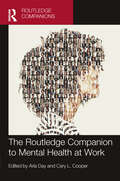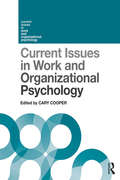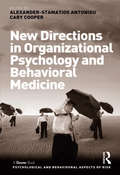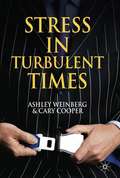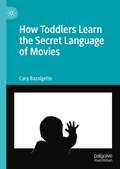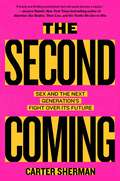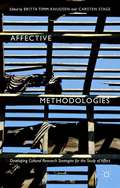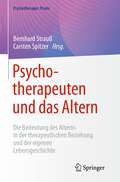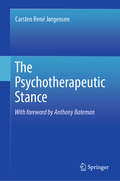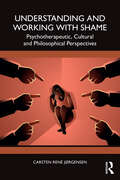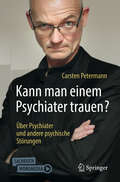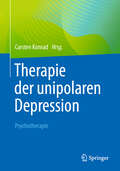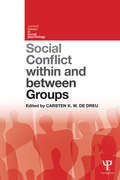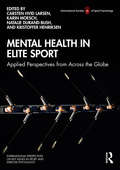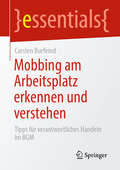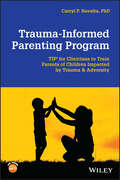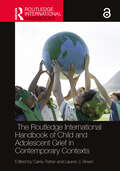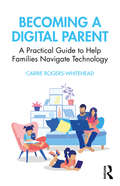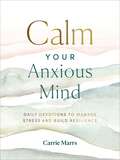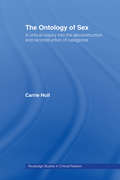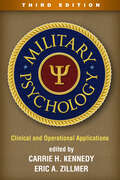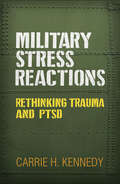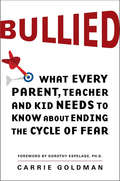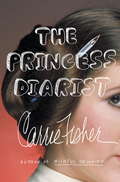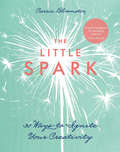- Table View
- List View
The Routledge Companion to Mental Health at Work (Routledge Companions in Business and Management)
by Cary L. Cooper Arla DayThe issue of mental health at work has become a hot topic in both the popular media and academic writings. Although job stress and mental ill-health are associated with negative outcomes for individuals, teams, and organizations, there has been some suggestion that changing the work environment and creating healthy workplaces can improve worker health. Much of the current works in the general of health is fractured, coming from a variety of disciplines and perspectives without an organizing framework to help guide research and practice in the area. Having this individualized, compartmentalized perspective constrains our ability to fully understand the scope of the issue, the key factors in supporting or detracting from one’s mental health, and interventions focusing on mental health at work. Given the importance of understanding mental health at work and the current lack of coverage on workplace mental health, there is a need for a book to provide a holistic overview of the issue targeting the environmental, individual, and group influences of mental health and well-being, as well as the impact on individuals and workplaces. This handbook provides a conceptual framework for examining these issues. Each chapter offers an in-depth examination of the key facets of mental health at work, focusing both on the seminal and current literature on the topic and practical suggestions for best practices for organizations. With contributions from leading experts, authors address the state-of-the-art research and integrate current events that are shaping the way we work and our wellbeing at work. This edited collection will be of interest to researchers, academics, policymakers, and advanced students in the fields of human resource management, organizational psychology, and management.
Current Issues in Work and Organizational Psychology
by Cary CooperCurrent Issues in Work and Organizational Psychology is a series of edited books that reflect the state-of-the-art areas of current and emerging interest in the psychological study of employees, workplaces, and organizations. Each volume focuses on a particular topic and consists of chapters contributed by international experts, with an introductory overview written by the editors, who are leading figures in their areas. For the first time, this book offers a comprehensive new collection which gathers together some of the most influential chapters from the series into one volume, providing an essential overview of the hottest topics in work and organizational psychology. Including 24 chapters by many of the leading researchers in the field, the book is split into two parts; the individual in the workplace, and how individuals are organized at work. Topics such as burnout, recruitment, well-being and organizational change are covered, as well as research on emerging topics such as flow, humor, i-deals, and socialization. With an introduction and conclusion by Professor Sir Cary Cooper, this is the ideal companion for any student or practitioner looking for an insightful overview of the most researched topics in work and organizational psychology.
New Directions in Organizational Psychology and Behavioral Medicine (Psychological and Behavioural Aspects of Risk)
by Cary CooperThis research shows the dynamic relationship between work, health and satisfaction. New Directions in Organizational Psychology and Behavioral Medicine, comprehensively covers new developments in the field of occupational health psychology and provides insight into the many challenges that will change the nature of occupational health psychology. The editors have gathered 40 experts from all over the developed world to discuss issues relevant to human resource and talent management, and specifically to employment related physical and psychological health issues. Especially because it comes at a time of economic turbulence that will create work stress and strain, organizations, researchers and practitioners will find this book valuable.
Stress in turbulent times
by Ashley Weinberg Cary CooperStress isundoubtedly one of the major work-related illness and is even more likely in times of economic uncertainty and downturn. Theauthors assess the psychological challenges created by instability and uncertainty and provide a survival toolkit that shows the reader how to combat stress in their own lives.
How Toddlers Learn the Secret Language of Movies
by Cary BazalgetteThis book takes a radically new approach to the well-worn topic of children's relationship with the media, avoiding the "risks and benefits" paradigm while examining very young children's interactions with film and television. Bazalgette proposes a refocus on the learning processes that children must go through in order to understand what they are watching on televisions, phones, or iPads. To demonstrate this, she offers unique insight from research done with her twin grandchildren starting from just before they were two years old, with analysis drawn from the field of embodied cognition to help identify minute behaviours and expressions as signals of emotions and thought processes. The book makes the case that all inquiry into early childhood movie-viewing should be based on the premise that learning–usually self-driven–is taking place throughout.
The Second Coming: Sex and the Next Generation's Fight Over Its Future
by Carter ShermanEqual parts investigative reporting and cultural criticism, this is a look at the sex lives of young adults in post-Roe v. Wade, post-#MeToo America—and how the challenges they face are harbingers of what&’s coming for the rest of us.As a college student, award-winning journalist Carter Sherman, along with several members of her sorority, was interviewed by a writer looking for salacious details about their sex lives. But the sex the girls were having—or the lack thereof—seemed disappointing, and their stories didn&’t make the book&’s final cut. A decade later, young Americans are having less sex than past generations, and the sex they are having is infinitely more complicated. Sherman, who has spent years traveling the country reporting on gender and sexuality, wanted to find out why. Based on more than one hundred interviews with teenagers and young adults, activists, and experts, The Second Coming reveals how (mis)education, the internet, and politics have not only reshaped relationships but also unleashed a nationwide power struggle over the future of sex. From abortion clinics crowded with young patients, to &“Dating with Dignity&” seminars at the National Pro-Life Summit, to school board battles over what students should read, think, and feel, we meet folks from both sides of the aisle who are well-informed, empowered, and active (even if not always sexually). And as measures are taken to limit Americans&’ access to rights and resources, they are fighting back. In the tradition of Rebecca Traister and Lisa Taddeo, The Second Coming explores how the ballot box has infiltrated the bedroom, and the breaking point as a nation we&’ve reached as a result.
Affective Methodologies: Developing Cultural Research Strategies For The Study Of Affect
by Britta Timm Knudsen Carsten StageThe collection proposes inventive research strategies for the study of the affective and fluctuating dimensions of cultural life. It presents studies of nightclubs, YouTube memes, political provocations, heritage sites, blogging, education development, and haunting memories.
Psychotherapeuten und das Altern: Die Bedeutung des Alterns in der therapeutischen Beziehung und der eigenen Lebensgeschichte (Psychotherapie: Praxis)
by Bernhard Strauß Carsten SpitzerDieses Werk beschäftigt sich mit dem Alter sowie dem Älter- bzw. Altwerden aus Sicht der Psychotherapie und ihrer Akteure. Zur Sprache kommen Psychotherapeut:innen und Vertreter:innen der Psychologie, Medizin, Philosophie und Soziologie, welche die unterschiedlichsten Fakten und empirischen Befunde zu dieser Thematik ebenso diskutieren wie die Zumutungen und das Gelingen des Älterwerdens. Besonders die Herausforderungen, die auf Psychotherapeutinnen und Psychotherapeuten im Alter zukommen können, werden diskutiert. Abgerundet wird das Werk durch eine Sammlung essayistischer autobiographischer Darstellungen namhafter Kolleg:innen aus verschiedenen Ländern und unterschiedlichen therapeutischen Richtungen zu Fragen wie: Was hat sie überrascht? Was war für sie schwierig? Was raten sie? Stichworte und Namen aus dem Inhalt: Teil I: Soziologische Altersforschung – Philosophische Aspekte des Alterns – Seniore Psychotherapeut:innen – Alter und neue Technik. Teil II: Statements zum Älterwerden u.a. von Marvin Goldfried, Lorna Smith Benjamin, Michael Geyer, Helga Hess, Gerd Rudolf, Ulrike und Gerd Lehmkuhl, Flora von Spreti und anderen. Die Herausgeber: Univ. Prof. Dr. phil. Dipl.-Psych. Bernhard Strauß, Universitätsklinikum Jena, Direktor des Instituts für Psychosoziale Medizin, Psychotherapie und Psychoonkologie. Univ. Prof. Dr. med. Carsten Spitzer, Universitätsmedizin Rostock, Direktor der Klinik für Psychosomatische Medizin und Psychotherapie.
The Psychotherapeutic Stance
by Carsten René JørgensenThis book provides a thorough critique of the dominating medical understanding of psychotherapy and argues for a dynamic relational understanding of psychotherapy, deeply founded in the most important results from empirical psychotherapy research. In the first part, the book critically examines the traditional focus on technical factors in psychotherapy based on available empirical research on the subject. It asks questions about whether specific techniques cure specific diagnoses or therapists and therapeutic relationships that cure persons. Part II of the book argues that the currently dominating medical understanding of psychotherapy must be challenged by a better understanding of psychopathology and psychotherapy that contextualizes the relationship between therapist and the patient. Overall, this book provides a new approach to some of the most important questions in psychotherapy and discusses what it means to think and work psychotherapeutically. The book is highly relevant for professionals in clinical/psychotherapy training and for advanced courses in psychotherapy, including courses on mentalization-based therapy, psychoanalytic psychotherapy and eclectic psychotherapy.
Understanding and Working with Shame: Psychotherapeutic, Cultural and Philosophical Perspectives
by Carsten René JørgensenThis book discusses the pivotal role of shame in a wide range of mental disorders and as a driving force in societal polarization and escalating conflicts between nations and population groups.Exploring the phenomenology of one of the most vulnerable and painful of human emotions, shame, Jørgensen dives deep into its many facets and the ways in which it manifests in mental illnesses and everyday life. Delving into an in-depth discussion of the differentiation between the moral and ethical feelings of guilt and shame, he presses the need to distinguish between constructive and destructive feelings of shame. He examines how shame permeates societal and cultural expectations, on both individual and collective levels. Solution-centric in its approach, the author not only discusses the destructive feelings of shame particularly common among individuals with more severe mental disorders, but also offers specific advice to therapists on how to deal with it.The book will be an essential read for psychoanalysts, psychotherapists, philosophers, and anyone wanting to understand the power of shame in our lives.
Kann man einem Psychiater trauen?: Über Psychiater und andere psychische Störungen
by Carsten PetermannIn einer Mischung aus Ernst, Satire, schwarzem Humor und Poesie nimmt der Autor, selber Facharzt für Psychiatrie und Psychotherapie, auf ungewöhnliche und kreative Weise den eigenen Berufsstand aufs Korn. In einer unterhaltsam-pointierten und zugleich fachkundigen Art und Weise vermittelt er darüber hinaus, wie nebenbei, Informationen über psychische Störungen, wie die Depression, die bipolare affektive Störung, die Borderline-Persönlichkeit sowie die paranoide Schizophrenie - mit dem Ziel, auf diese einzigartige und empathische Weise Betroffenen und Angehörigen Hilfestellung anzubieten. Audioclips zu ausgewählten Abschnitten sind per MoreMediaApp abrufbar und geben einen Eindruck vom begleitenden Bühnenprogramm. Zielgruppe sind alle Leser, die sich auf unterhaltsame Weise über psychische Erkrankungen informieren möchten und schon immer gerne wissen wollten - kann man einem Psychiater trauen?
Therapie der unipolaren Depression - Psychotherapie
by Carsten KonradDieses Buch stellt die gängigen psychotherapeutischen Verfahren dar, die in der Behandlung der unipolaren Depression eingesetzt werden können.Jedes Kapitel widmet sich der Darstellung eines für die Depressionsbehandlung geeigneten Psychotherapieverfahrens. Jedes Kapitel wird von der Schilderung eines typischen Falls durchzogen, an dem die einzelnen Interventionen im Therapieverlauf illustriert werden. Die Psychotherapieverfahren werden in einzelne Handlungsschritte (Module) unterteilt und mit Online-Materialien wie Arbeitsblätter, Informationsmaterialien, Aufklärungsbögen etc. unterlegt. Ziel des Buches ist es, eine praxisnahe Anleitung zu den verschiedenen Psychotherapieverfahren zu geben. Das Lesen einzelner Kapitel ohne den Zusammenhang mit den anderen Kapiteln ist möglich.Das Buch stellt die Fortführung und Aktualisierung der Psychotherapie-Sektion in Konrad, C.: Therapie der Depression – Praxisbuch der Behandlungsmethoden, Springer 2017, dar und richtetsich in erster Linie an psychotherapeutisch tätige Ärzt:innen und Psycholog:innen, die sich für eine moderne psychotherapeutische Behandlung der Depression interessieren.
Social Conflict within and between Groups
by Carsten K. W. De DreuIntergroup competition and conflict create pervasive problems in human society, giving rise to such phenomena as prejudice, terrorism, ethnic cleansing, and interstate war. Citizens, policy makers, social workers, schoolteachers, and politicians wrestle with these problems, and with difficult questions these issues pose: What causes conflict to escalate? How should we manage conflict within communities, and also in society at large? Is conflict always bad, or does it have other more beneficial consequences? Social Conflict within and between Groups provides an overview of contemporary research from the social sciences on these questions. It brings together the research output of a number of leading researchers in psychology, management and economics, sociology and political science, and draws on the outcomes of ten prominent research programs conducted over the past five years. The chapters cover a range of fascinating topics, including prejudice and discrimination in multi-ethnic societies, and conflict and negotiation in the field of industrial relations. The authors also consider the possibilities for intervention at the interpersonal, intergroup and societal level. This is the first volume to provide an interdisciplinary overview of the various scientific approaches to studying the origins and consequences of social conflict. It will be of great interest to researchers, graduates and upper-level undergraduate students from across the social and behavioural sciences.
Mental Health in Elite Sport: Applied Perspectives from Across the Globe (ISSP Key Issues in Sport and Exercise Psychology)
by Carsten Hvid LarsenMental Health in Elite Sport: Applied Perspectives from Across the Globe provides a focused, exhaustive overview of up-to-date mental health research, models, and approaches in elite sport to provide researchers, practitioners, coaches, and students with contemporary knowledge and strategies to address mental health in elite sport across a variety of contexts. Mental Health in Elite Sport is divided into two main parts. The first part focuses globally on mental health service provision structures and cases specific to different world regions and countries. The second part focuses on specific mental health interventions across countries but also illustrates specific case studies and interventions as influenced by the local context and culture. This tour around the world offers readers an understanding of the massive global differences in mental health service provision within different situations and organizations. This is the first book of its kind in which highly experienced scholars and practitioners openly share their programs, methods, reflections, and failures on working with mental health in different contexts. By using a global, multi-contextual analysis to address mental health in elite sport, this book is an essential text for practitioners such as researchers, coaches, athletes, as well as instructors and students across the sport science and mental health fields.
Mobbing am Arbeitsplatz erkennen und verstehen: Tipps für verantwortliches Handeln im BGM (essentials)
by Carsten BurfeindIn diesem essential gibt Carsten Burfeind einen Überblick über alle relevanten Aspekte des komplexen Geschehens „Mobbing am Arbeitsplatz“. Es wird deutlich, dass die Reduktion psychischer Belastungen die beste Mobbingprävention darstellt, denn Stress fördert Mobbing und Mobbing stresst, und dass der Schutz der Betroffenen Vorrang vor anderen betrieblichen Maßnahmen hat. Das Buch enthält Tipps und Hinweise für verantwortliches Handeln im konkreten Mobbingfall und gibt den Leserinnen und Lesern Handlungsempfehlungen für eine betriebliche Konflikt- und Mobbingprävention.
Trauma-Informed Parenting Program: TIPs for Clinicians to Train Parents of Children Impacted by Trauma and Adversity (Wiley Essential Clinical Guides to Understanding and Treating Issues of Child Mental Health)
by Carryl P. NavaltaA critical handbook for clinicians treating trauma-impacted children Trauma-Informed Parenting Program (TIPs for Parents): A Guide for Clinicians to Teach Parents How to Foster their Children's Emotion Regulation delivers essential information about involving the parents of trauma-impacted children in their clinical care. In the book, distinguished practitioner Carryl P. Navalta walks readers through the assessment, conceptualization, and treatment of children affected by adverse childhood events and the steps necessary to teach parents how to foster their child's behavioral regulation. The author also includes: Thorough introductions to trauma, including descriptions of its historical roots and its prevalence in various populations. A blueprint to successfully conceptualizing cases, including the creation of effective clinical formulations that integrate, identify, and define the primary problems facing the child A comprehensive discussion of treatment plan creation, including explorations of goal development, objective construction, intervention creation, and diagnosis determination A must-read guide to the holistic clinical treatment of trauma-impacted children and children experiencing adverse childhood events, Trauma-Informed Parenting Program (TIPs for Parents): A Guide for Clinicians to Teach Parents How to Foster their Children's Emotion Regulation belongs on the bookshelves of any clinician hoping to maximize the beneficial potential of the parents of their clients over the course of their treatment.
The Routledge International Handbook of Child and Adolescent Grief in Contemporary Contexts (Routledge International Handbooks)
by Carrie Traher and Lauren J. BreenThis volume presents the leading research in child and adolescent grief from a diverse and global perspective, focusing on the systemic, political, and cultural processes that have a direct bearing on the way youth experience loss and grief. Carrie Traher and Lauren J. Breen bring together a global community of academics, practitioners, and social activists to discuss and address the complexity of lived experiences of grief for young people today. Presented in four parts, the contributors begin by providing a theoretical overview of youth, grief, and bereavement, before moving onto other important topics, such as suicide bereavement, the trauma of war, digital grief narratives, child soldiering, and more. Within each chapter, authors address contemporary theoretical frameworks, research findings, and praxis related to both death and non-death losses, such as the Black Lives Matter movement, environmental grief, and grief on the internet and social media. Including contributors from a range of countries and from various disciplines, such as educators, health care professionals, policy makers, and advocates, the themes of coping, resilience, and growth are central and interwoven in each chapter. This handbook is essential for researchers, clinicians, scholars, educators, parents, and activists as to the most pressing societal and global issues that affect youth grief today and to provide context to their personal and professional interactions with youth. Chapter 9 of this book is freely available as a downloadable Open Access PDF at http://www.taylorfrancis.com under a Creative Commons Attribution-Non Commercial-No Derivatives (CC-BY-NC-ND) 4.0 license.
Becoming a Digital Parent: A Practical Guide to Help Families Navigate Technology
by Carrie Rogers WhiteheadBecoming a Digital Parent is a practical, readable guide that will help all parents have confidence to successfully navigate technology with their children. It accessibly presents evidence-based guidance to offer an overview of the digital landscape, empowering parents to embrace opportunities whilst keeping children responsible and safe online. Covering a range of topics including developmental stages, screen time, bed time, gaming, digital identities, and helpful parenting apps and resources, Carrie Rogers-Whitehead explores the challenges and opportunities involved in parenting in the digital age. With advice for parents of babies through to teenagers, each chapter includes an explanation of the latest research, interviews with parents and experts, and helpful case studies gathered by the author during her extensive experience of working directly with parents and children. This book will show parents how to communicate better with their children, create a family technology plan, put in place intervention strategies when things happen, and take advantage of the benefits technology can afford us. Becoming a Digital Parent is ideal for all parents looking to effectively navigate the technological world, and the range of professionals who work with them.
Calm Your Anxious Mind: Daily Devotions to Manage Stress and Build Resilience (A 365-Day Devotional to Help You Embrace Peace and Wellness and Leave Behind Worry and Anxiety)
by Carrie MarrsExperience the peace your soul longs for.When left unchecked, our thoughts can spiral out of control. We try harder and worry more as we watch the headlines and fill our calendars. But only God can bring us the relief from anxiety that our souls long for. Even in difficult times, we can experience God's presence. Calm Your Anxious Mind offers you daily invitations to embrace the peacefulness God gives you no matter your circumstances.In Calm Your Anxious Mind, men and women will find:Inspiring and comforting Scripture versesQuotations about giving and receiving God's peacePrayer prompts and thoughtful reflections on trusting GodPractical ideas for living beyond anxietyInsights into triggers for anxiety With a topical table of contents, research-based strategies for easing an anxious mind, and continual reminders of God's love, this yearlong devotional will help you:Process and let go of anxiety about finances, politics, and illnessPractice mindfulness techniquesNurture body and soul with ideas you can implement immediatelyStay connected with those you love Calm Your Anxious Mind is a wonderful self-gift if you are feeling worried or stressed and looking for relief. This devotional is a beautiful and thoughtful gift for friends or family who are dealing with anxiety or uncertain times.Calm. Quiet. Settled. No matter what is happening in your life or around you, you can receive a spiritual peace that is beyond understanding. Find daily comfort and inspiration in this timely devotional designed to ease the anxieties of your heart and mind. With continual reminders of God's faithfulness, Calm Your Anxious Mind will help you find balance and wellness, experience the good, and let go of worry about the future.
Ontology of Sex: A Critical Inquiry Into The Deconstruction And Reconstruction Of Categories (Routledge Studies in Critical Realism)
by Carrie HullPoststructuralism, particularly through the writings of Michel Foucault and Judith Butler, has achieved remarkable success in challenging our belief in natural sex categories and instincts. Here, Carrie Hull endorses the progressive ideals of poststructuralism while demonstrating the superiority of a realist account of sex and sexuality. Embracing biological and cultural variability, Hull nonetheless shows that the sexed body is naturally structured and deeply meaningful. Poststructuralist philosophers have argued that biological sex is a continuum rather than a binary, and that sex identity and drive are entirely performances of cultural norms rather than expressions of innate qualities. Hull draws parallels with Nelson Goodman, W.V.O. Quine, and B.F. Skinner to show that these poststructuralist theories are rooted in a nominalist, relativist, and behaviourist philosophy, and develops an alternative framework using arguments from contemporary and critical realism. Employing colourful illustrations from biology, anthropology and psychology, Hull demonstrates the rich potential of realist philosophy, and concludes that it is philosophically and scientifically correct, on one hand, and politically advisable, on the other, to maintain a distinction - albeit attenuated - between sex and gender, and sexuality and behaviour.
Military Psychology, Third Edition: Clinical and Operational Applications
by Carrie H. Kennedy and Eric A. ZillmerWith more than 60% new material reflecting advances in evidence-based treatments and the evolving roles of military mental health providers, the authoritative resource in the field is now in a significantly revised third edition. The volume provides research-based roadmaps for prevention and intervention with service members and veterans in a wide range of settings. Up-to-date information about military procedures and guidelines is included throughout. Grounded in current knowledge about stress and resilience, chapters describe best practices in treating such challenges as depression, anxiety disorders, posttraumatic stress disorder, and substance use disorders. Also addressed are operational functions of psychologists in personnel assessment and selection, counterintelligence, and other areas. New to This Edition *Chapters on new topics: the spectrum of military stress reactions, concussion management, military sexual assault, embedded/expeditionary psychological practice, and security clearance evaluations. *Fully rewritten chapters on evidence-based treatments, behavioral health in primary care, and disaster mental health. *Incorporates major shifts in how and where military mental health services are delivered.
Military Stress Reactions: Rethinking Trauma and PTSD
by Carrie H. KennedyMany people--including some mental health professionals and service members themselves--have the misconception that military deployment is highly likely to cause posttraumatic stress disorder (PTSD). This book gives practitioners a more nuanced understanding of military stress reactions and related mental health concerns, from transient adjustment problems to clinical disorders. Drawing on expert knowledge of military environments and culture, Carrie H. Kennedy provides vital guidance for evidence-based assessment, intervention, and prevention. Kennedy emphasizes that overdependence on the diagnosis of PTSD can lead to suboptimal care, and shows how to tailor treatment to each service member's or veteran's needs. A crucial addition to any practitioner's library, the book is illustrated with numerous case vignettes.
Bullied: What Every Parent, Teacher, and Kid Needs to Know About Ending the Cycle of Fear
by Carrie GoldmanCarrie Goldman became an unexpected voice for the antibullying movement after her blog post about her daughter Katie's bullying experience went viral and an online community of support generated international attention. In Bullied, Goldman brings together the expertise of leading authorities with the candid accounts of families dealing firsthand with peer victimization to present proven strategies and concrete tools for teaching children how to speak up and carry themselves with confidence; call each other out on cruelty; resolve conflict; cope with teasing, taunting, physical abuse, and cyberbullying; and be smart consumers of technology and media. As a mother, she calls on us all—families, schools, communities, retailers, celebrities, and media—to fiercely examine our own stereotypes and embrace our joint responsibility for creating a culture of acceptance and respect. For parents, educators, and anyone still wrestling with past experiences of victimization and fear, Bullied is an eye-opening, prescriptive, and ultimately uplifting guide to raising diverse, empathetic, tolerant kids in a caring and safe world. At least 25 percent of kids have been bullied online. One in five teens has been bullied at school. More than half of bullying behaviors will stop in less than ten seconds when another student intervenes.
The Princess Diarist
by Carrie Fisher<P>The Princess Diarist is Carrie Fisher's intimate, hilarious and revealing recollection of what happened behind the scenes on one of the most famous film sets of all time, the first Star Wars movie. Named a PEOPLE Magazine Best Book of Fall 2016. <P>When Carrie Fisher recently discovered the journals she kept during the filming of the first Star Wars movie, she was astonished to see what they had preserved--plaintive love poems, unbridled musings with youthful naiveté, and a vulnerability that she barely recognized. Today, her fame as an author, actress, and pop-culture icon is indisputable, but in 1977, Carrie Fisher was just a teenager with an all-consuming crush on her costar, Harrison Ford. <P>With these excerpts from her handwritten notebooks, The Princess Diarist is Fisher's intimate and revealing recollection of what happened on one of the most famous film sets of all time--and what developed behind the scenes. And today, as she reprises her most iconic role for the latest Star Wars trilogy, Fisher also ponders the joys and insanity of celebrity, and the absurdity of a life spawned by Hollywood royalty, only to be surpassed by her own outer-space royalty. <P>Laugh-out-loud hilarious and endlessly quotable, The Princess Diarist brims with the candor and introspection of a diary while offering shrewd insight into the type of stardom that few will ever experience. <P><b>A New York Times Bestseller</b>
The Little Spark: 30 Ways to Ignite Your Creativity
by Carrie Bloomston&“Tips for finding and nourishing the inner artist . . . chock-full of concrete, hands-on tips that can help the newbie develop habits of creativity.&”—Publishers Weekly (starred review) You were born with a creative spark inside. Do you look at yourself now and wonder if the spark has gone out? Ignite that inner fire with the 30 engaging exercises, fun activities, inspirational images, and motivating ideas in this book. Learn what your Little Spark of creative passion looks like, how to capture it, and how to make room for it in your life. Read the book cover-to-cover and use it as a month-long creative roadmap, or just dip into the exercises as your time and inclination allow. Either way, you will change your life. &“An interactive workbook for igniting creativity. It&’s peppered with tales from dancers, yogis, artists and more, and is filled with fun ideas.&”—Associated Press &“One of those books with its own energy and enthusiasm that literally lights you up!&”—David Romanellii, author of Life Lessons from the Oldest and Wisest &“The book&’s design beautifully weaves together text, blank write-in spaces, stellar photos and a host of other charming design elements. A sparkling blueprint for stimulating creativity.&”—Kirkus Reviews &“The color photographs and layout of the book are particularly pleasing and inspiring . . . A beneficial and enjoyable title for people who need a bit of a nudge to try something creative, or those who used to paint, write, or sew, who want to do it again.&”—Library Journal &“For any person you know who wants to make stuff, any kind of stuff, that is an authentic expression of themselves.&”—Quilt Journalist Newsletter
